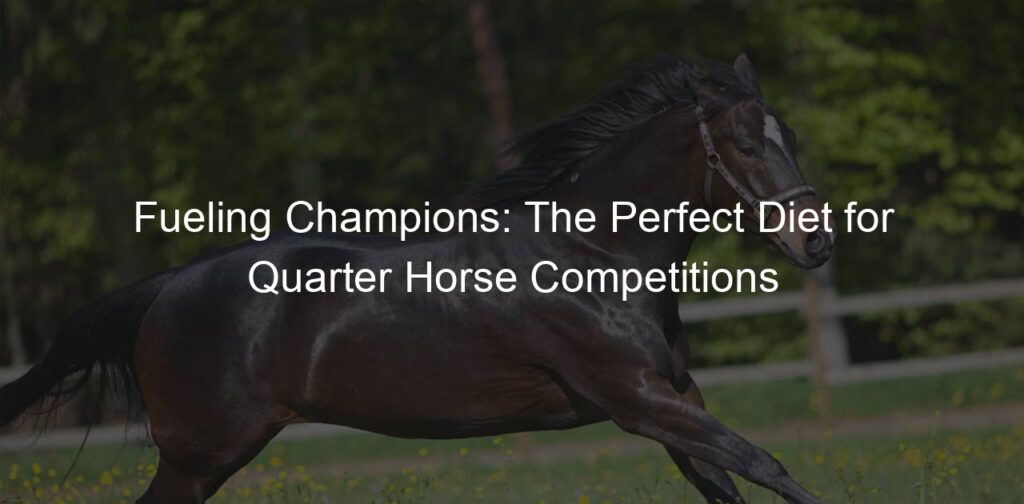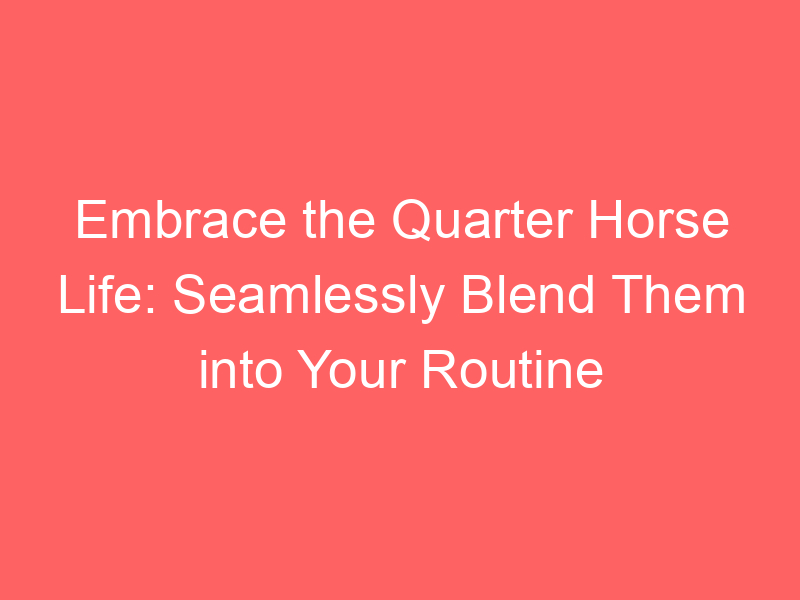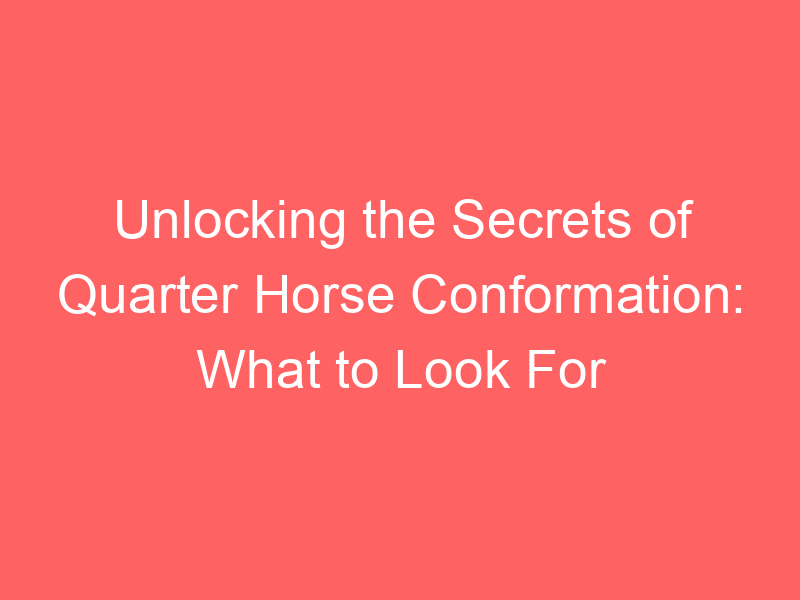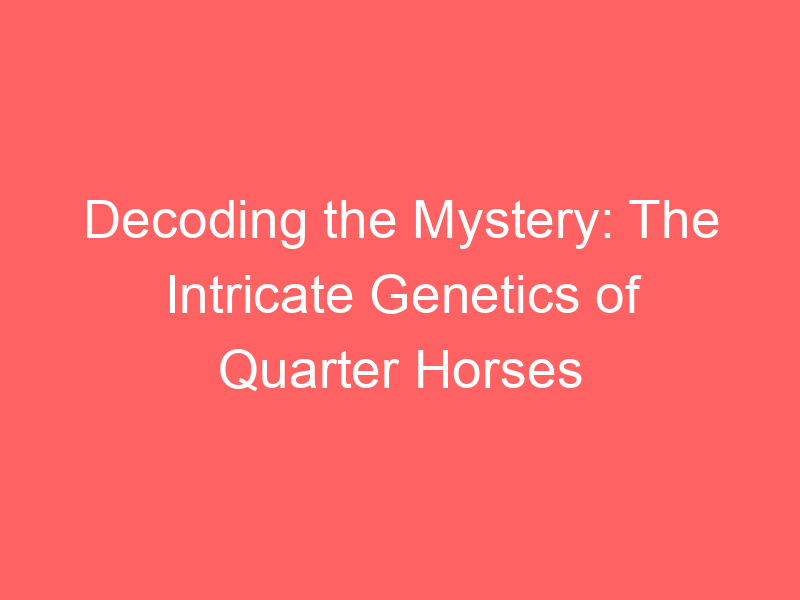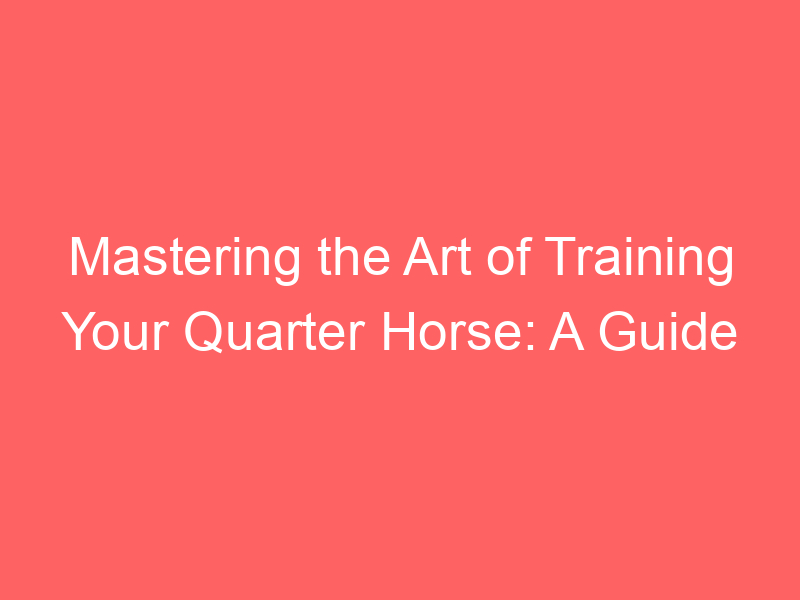Introduction to Quarter Horse Diet
Hey there, horse lovers! Today, we’re going to dive into the fascinating world of Quarter Horse diets. These incredible creatures need a special kind of nutrition to keep them healthy and competitive. So, let’s saddle up and get started!
- The Importance of Nutrition in Horse Competitions
- Understanding the Basics of Equine Diet
When it comes to horse competitions, nutrition plays a key role. A well-fed horse is a happy horse, and a happy horse performs better. According to Wikipedia, a horse’s diet can affect its energy levels, muscle development, and overall health. So, if you want your Quarter Horse to be a champion, you need to feed it like one!
So, what exactly should a Quarter Horse eat? Well, the basics of an equine diet include hay, grains, and plenty of water. But it’s not just about what they eat, but also how much and when. For example, horses need to eat small meals throughout the day instead of one big meal. This helps keep their digestive system healthy. And remember, always consult with a vet or a horse nutrition expert to make sure your horse is getting the right nutrients.
Stay tuned for more insights on Quarter Horse nutrition in our upcoming sections. We’ll be covering everything from specific diet plans to real-life case studies. So, whether you’re a horse owner, a rider, or just a horse enthusiast, there’s something for everyone. Happy reading!
Understanding Quarter Horse Nutrition
When it comes to feeding your Quarter Horse, it’s not just about filling their belly. It’s about providing them with the right nutrients to keep them healthy and strong. Let’s dive into the key components of a Quarter Horse diet!
Key Components of a Quarter Horse Diet
- Proteins
- Fats
- Carbohydrates
- Vitamins and Minerals
Proteins are the building blocks of the body. They help in muscle development and repair. A Quarter Horse needs a diet rich in proteins to maintain its strength and agility. Foods like alfalfa hay, soybean meal, and linseed meal are excellent sources of proteins for your horse.
Fats are a great source of energy for your Quarter Horse. They provide more than twice the energy of proteins or carbohydrates. Adding a little bit of oil or high-fat feed to your horse’s diet can help them maintain their energy levels, especially during intense training or competition.
Carbohydrates are another important source of energy for your Quarter Horse. They are found in almost all types of horse feeds. However, it’s important to balance the amount of carbohydrates in your horse’s diet to avoid health issues like laminitis or colic.
Vitamins and minerals are essential for various bodily functions. They help in bone development, digestion, and maintaining a healthy coat among other things. Make sure your horse’s diet includes a variety of fruits, vegetables, and specially formulated horse feeds to meet their vitamin and mineral needs.
Remember, every horse is unique and their nutritional needs may vary based on their age, health status, and activity level. Always consult with a vet or a horse nutrition expert to create a balanced diet plan for your Quarter Horse.
Common Mistakes in Quarter Horse Feeding
Feeding your Quarter Horse properly is super important. But, sometimes we make mistakes. Let’s talk about some common ones.
- Overfeeding or Underfeeding
- Not Providing Enough Water
- Ignoring the Importance of Forage
It’s easy to give your horse too much or too little food. Overfeeding can lead to obesity, which can cause health problems like laminitis. Underfeeding, on the other hand, can lead to weight loss and weakness. It’s important to find the right balance. A vet or a horse nutrition expert can help you figure out how much your horse should be eating.
Water is super important for horses. They need it to digest their food and stay hydrated. If a horse doesn’t get enough water, it can get dehydrated. This can lead to serious health problems. Make sure your horse always has access to clean, fresh water.
Forage, like hay or grass, should be the main part of a horse’s diet. It’s good for their digestive system and it keeps them busy. Some people think that horses only need grain, but that’s not true. Forage is super important. If your horse doesn’t get enough, it can lead to problems like ulcers or colic.
Remember, every horse is different. What works for one might not work for another. Always talk to a vet or a horse nutrition expert if you’re not sure about something. They can help you make the best choices for your horse.
Horse Competition Nutrition
When it comes to horse competitions, nutrition plays a crucial role. The right diet can make a significant difference in a horse’s performance. Let’s dive into the details!
Nutrition Preparation Before a Horse Competition
Preparing your horse’s nutrition before a competition is like packing a lunchbox for a big day. It’s all about balance and giving your horse what it needs to perform at its best. Here are some key steps:
- Adjusting the Diet
- Hydration
- Supplementation
Before a competition, it’s important to adjust your horse’s diet to meet its increased energy needs. This might mean adding more high-quality hay or grains to their diet. Remember, changes should be made gradually to avoid digestive upset. Wikipedia has more information on horse nutrition if you’re interested!
Hydration is key! Make sure your horse has access to plenty of fresh, clean water before the competition. Dehydration can lead to poor performance and even health issues. So, keep that water trough full!
Supplements can give your horse an extra boost. Things like electrolytes can help with hydration, and energy supplements can help your horse maintain stamina. But remember, supplements should never replace a balanced diet. Always consult with a vet before starting any new supplement regimen.
Proper nutrition preparation before a horse competition can help your horse perform at its best. It’s all about balance, hydration, and maybe a little supplementation. Good luck at the competition!
Nutrition Management During a Horse Competition
Hey there, horse lovers! Let’s dive into the exciting world of horse competition nutrition. When our four-legged friends are in a competition, they need to be at their best. And guess what? Their diet plays a huge role in this. So, let’s talk about how to manage their nutrition during a competition.
- Maintaining Energy Levels
- Ensuring Proper Hydration
During a competition, a horse needs a lot of energy. And where does this energy come from? You guessed it – their food! It’s important to feed your horse a balanced diet that includes high-quality hay and grains. This will provide them with the energy they need to perform at their best. But remember, don’t overfeed them right before a competition. It’s better to feed them small amounts throughout the day to maintain their energy levels.
Water is super important for horses, especially during a competition. Horses can lose a lot of water through sweating, so they need to drink plenty to stay hydrated. Make sure your horse has access to fresh, clean water at all times. And don’t forget, horses also get water from their food, especially from fresh fruits and vegetables. So, include these in their diet too!
So, there you have it, folks! Managing your horse’s nutrition during a competition is all about maintaining their energy levels and ensuring they stay hydrated. Follow these tips and your horse will be ready to win that blue ribbon!
Equine Competition Nutrition
Hey there, horse lovers! Today, we’re going to chat about something super important – equine competition nutrition. This is all about what our four-legged friends need to eat and drink before, during, and after a competition to perform their best and stay healthy. Let’s dive in!
Post-Competition Nutrition for Recovery
So, the competition is over and your Quarter Horse did a fantastic job. But, the work isn’t done just yet. Now, it’s time to focus on recovery. Here’s what you need to know:
- Rehydration
- Replacing Lost Nutrients
- Rest and Recovery
Just like us, horses lose a lot of water when they exercise. That’s why it’s super important to make sure they drink plenty of water after a competition. Some horses might need a little encouragement, so try adding a bit of apple juice to their water or offering a wet feed. Wikipedia has some great tips on how to keep your horse hydrated.
Competing takes a lot of energy, and that means your horse will need to replace the nutrients they’ve lost. High-quality hay is a great start, but they might also need a special feed or supplement. Your vet can help you figure out what’s best for your horse.
Last but not least, your horse needs to rest. This might seem obvious, but it’s easy to forget when you’re caught up in the excitement of a competition. Make sure your horse has a quiet, comfortable place to relax and recover. And remember, a little love and attention can go a long way!
So there you have it, folks! Equine competition nutrition is all about making sure your horse has what they need to perform their best and recover quickly. Remember, every horse is different, so what works for one might not work for another. Always consult with your vet and listen to your horse. They’ll let you know what they need!
Quarter Horse Diet Plan
Feeding your Quarter Horse correctly is a big part of keeping them happy and healthy. Let’s dive into how you can create a balanced diet plan for your horse.
Creating a Balanced Quarter Horse Diet Plan
Creating a balanced diet for your Quarter Horse involves understanding their nutritional needs, choosing the right feed, and adjusting the diet based on their activity levels. Let’s break it down:
- Understanding Your Horse’s Nutritional Needs
- Choosing the Right Feed
- Adjusting the Diet Based on Activity Levels
Every horse is unique, and so are their nutritional needs. Quarter Horses typically need a diet rich in protein, fiber, vitamins, and minerals. They also need plenty of fresh water. The exact amounts will depend on their age, weight, and activity level. For example, a young, active Quarter Horse will need more calories than an older, less active one. Here is a great resource to learn more about horse nutrition.
There are many different types of horse feed available, so it’s important to choose the right one for your Quarter Horse. Hay is a great source of fiber and should make up the bulk of their diet. You can also supplement with grains like oats or corn, but be careful not to overfeed these as they can lead to health problems. Always choose high-quality feed and avoid anything moldy or dusty.
Just like humans, horses need more food when they’re more active. If your Quarter Horse is used for riding or competing, they’ll need more calories to keep up with their energy expenditure. On the other hand, if they’re mostly sedentary, you’ll need to reduce their food intake to prevent weight gain. Remember, it’s always best to consult with a vet or equine nutritionist to make sure your horse’s diet is balanced and appropriate for their activity level.
Remember, a balanced diet is key to keeping your Quarter Horse healthy and happy. So take the time to understand their nutritional needs, choose the right feed, and adjust their diet based on their activity levels. Your horse will thank you!
Nutrition for Horse Competition: Case Studies
Let’s dive into some real-life examples of how proper nutrition can make a big difference in horse competitions. We’ll start with a case study of a winning Quarter Horse.
Case Study 1: Successful Nutrition Management for a Winning Quarter Horse
Meet Starlight, a beautiful Quarter Horse who won the 2018 National Quarter Horse Championship. Starlight’s success wasn’t just due to her speed and agility, but also her well-managed diet.
Starlight’s Diet:
- High-quality hay: Starlight’s diet consisted of 70% hay, which is a great source of fiber and essential for a horse’s digestive health.
- Grains: Starlight was also fed a balanced mix of oats, corn, and barley, which provided her with the necessary energy for her intense training and competitions.
- Supplements: In addition to her regular diet, Starlight was given vitamin and mineral supplements to ensure she was getting all the nutrients she needed.
Results:
Thanks to her balanced diet, Starlight had plenty of energy for her training sessions and competitions. She was able to maintain a healthy weight, had a shiny coat, and was in excellent overall health. Her success in the 2018 Championship is a testament to the importance of proper nutrition in horse competitions.
| Food | Percentage in Diet |
|---|---|
| Hay | 70% |
| Grains | 25% |
| Supplements | 5% |
Starlight’s story is a great example of how a well-managed diet can lead to success in horse competitions. Remember, every horse is unique and may require a different diet. Always consult with a veterinarian or equine nutritionist to ensure your horse is getting the nutrition it needs.
Case Study 2: Overcoming Nutrition Challenges in Horse Competitions
Hey there, horse lovers! Let’s dive into a fascinating story about a Quarter Horse named Thunder. Thunder faced some serious nutrition challenges during his competition days. But don’t worry, this story has a happy ending!
Thunder, a stunning Quarter Horse, was gearing up for a big competition. But his owner, Sarah, noticed that he was losing weight and seemed less energetic. She was worried and knew something had to change.
After consulting with a vet, Sarah learned that Thunder’s diet wasn’t providing him with the right nutrients he needed for his training. He was lacking in protein and had too much fat in his diet. This was a big problem! But Sarah was determined to help Thunder.
| Before | After |
|---|---|
| High-fat diet | Protein-rich diet |
| Low energy | High energy |
| Weight loss | Healthy weight |
With the help of a nutritionist, Sarah created a new diet plan for Thunder. She replaced high-fat feeds with protein-rich ones. She also started giving him supplements to ensure he was getting all the nutrients he needed.
Guess what happened next? Thunder started gaining weight and his energy levels shot up. He was back to his old self, ready to take on the competition. And guess what? He won!
Thunder’s story is a great example of how proper nutrition can make a huge difference in a horse’s performance. So, remember, a healthy horse is a happy horse!
Want to learn more about Quarter Horse nutrition? Check out this Wikipedia page about the American Quarter Horse. It’s packed with useful information!
Conclusion: The Impact of Proper Nutrition on Quarter Horse Competitions
As we wrap up our discussion on Quarter Horse nutrition, it’s clear that the right diet can make a world of difference in competitions. Let’s summarize the key points and share some final thoughts.
- Key Takeaways
- Quarter Horses require a balanced diet of hay, grains, and supplements to meet their nutritional needs.
- Proper nutrition can enhance a Quarter Horse’s stamina, speed, and overall performance in competitions.
- Each horse is unique and may require a customized diet plan. Consult with a vet or equine nutritionist to ensure your horse is getting the nutrients it needs.
- Final Thoughts
Feeding your Quarter Horse the right nutrients not only improves their health but also their performance in competitions. Here are the main points we’ve covered:
Remember, a well-fed horse is a happy and successful horse. By understanding and implementing proper nutrition, you’re setting your Quarter Horse up for success in competitions and in life. Keep learning, keep experimenting, and most importantly, keep loving your horse. As the old saying goes, “The outside of a horse is good for the inside of a man.”
Thanks for joining us on this journey through Quarter Horse nutrition. We hope you’ve found this information helpful and that it inspires you to take the best possible care of your horse. Happy riding!

